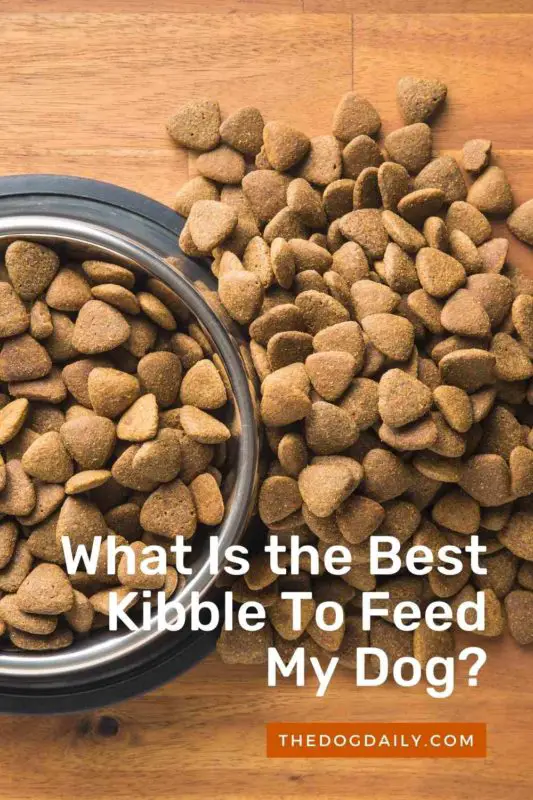What Is the Best Dog Kibble?
Selecting the right kibble for your dog can be an overwhelming task. After all, there are dozens of choices on the market these days. To help simplify your decision, ask yourself these seven questions:
-
What Life Stage is Your Dog?
This is an important initial question, as it will then help narrow your choices, says Korinn E. Saker, DVM, president of the American Academy of Veterinary Nutrition. Puppies, for instance, should be on a growth diet, which will contain the proper nutrients for their rapid development. An adult maintenance diet may be best for healthy adults, and senior dogs will thrive on food made specifically for their geriatric needs. However, Only 11 percent of U.S. pet owners consider their pet’s age when determining which formula to feed their pet. “I always tell my patients that healthy checkups start on the inside,” says Dr. Katy Nelson. Dr. Nelson is an emergency veterinarian in Alexandria, Va., who is also a member of the Iams Pet Wellness Council, who encourages feeding a pet a high-quality diet specific to an animal’s age.
It’s essential to consider the stages of life for dogs when deciding on pet food choices. “Diet requirements — including protein levels, calories and vitamins and minerals — vary over the life of a pet,” says Nelson. “In turn, an animal’s needs change as he grows from a puppy to an adult into a senior.”
Nelson shares these basic guidelines:
-
One To 12 Months
Puppy formula at this stage should include DHA for brain and vision development. Dr. Amy Dicke, a technical service veterinarian, explains that DHA stands for docosahexaenoic acid, an omega-3 fatty acid. “The benefits of a diet rich in DHA starts in the womb, much like pregnant women taking prenatal vitamins,” says Dicke.
Our Puppy Kibble Recommendations:
-
One To 7 Years
Adult-formula dry dog foods should have crunchy kibbles to help keep teeth clean and tartar-free. Look for phrases like “dental care” on dog food labels. Foods for adult dogs should also contain a balanced omega 6-to-3 ratio for healthy skin and coat.
Our Adult Dog Kibble Recommendations
-
Seven Years and Older
A senior formula with L-carnitine helps burn fat and keeps muscles lean. L-carnitine is a vitamin-like compound that helps turn fat into energy. Losing weight can mean losing muscle and fat, but adding L-carnitine to a diet helped overweight dogs maintain muscle and lose fat. Weight loss diets may also feature enhanced levels of vitamin A to reduce weight regain.
Our Senior Dog Kibble Recommendations
-
What’s the Health Status Of Your Dog?
If your dog is healthy, choose food based on life stage. If your dog has health conditions, talk with your veterinarian, since another food type could make a difference. For instance, if your pet has allergies to pollen or grass, a food with omega-3 fatty acids could help minimize inflammation associated with allergies, says Dr. Saker.
-
Does the Food Meet AAFCO Standards?
The Association of American Feed Control Officials (AAFCO) sets standards for pet food manufacturers. The product will carry a statement indicating it is complete and balanced and what life stage it is intended to support.
-
What Does the Ingredient List Include?
Thirty percent of Americans rank ingredients as the most important criteria when selecting food. “If you pick up a bag of pet food and you see a vegetable-based protein (glutens) in the top few ingredients, keep moving down the aisle,” says Dr. Katy Nelson. “High-quality foods are made with animal-based proteins and high-quality refined meals.”
Ingredients appear in the proportion in which they occur in the food. For instance, if chicken is first and rice is fourth, it has a higher chicken ratio by weight than rice.
Take note of how much protein is in the food. Higher-level protein diets generally work well for puppies, pregnant dogs, and service animals with more physical demands. Older canines also need excellent quality protein, so look for foods with the actual meat or meal close to the top.
-
How Big Is the Manufacturer?
The bigger the company, the more money it has to spend on research and development. “It may also have more stringent quality control measures and be able to offer high-quality foods at reasonable prices,” says Dr. Saker. That doesn’t mean you cannot buy from a smaller company; be aware of this potential difference.
-
What Size Is Your Dog?
Dog food comes in kibbles of various sizes.
While you might think any size will work, buy one appropriately sized for your dog’s mouth.
-
Is Your Dog Overweight?
If your dog is a little heavy, the weight issue needs to be addressed. But don’t do it by cutting back on your dog’s regular food. “You’ll reduce calories, but you’ll also cut valuable nutrients,” says Dr. Saker. Instead, purchase a calorie-restricted food reduces the number of fat calories while still providing optimal nutrition. Be sure to follow the feeding instructions on the food’s packaging.
The ultimate test, however, will be passing your dog’s lip-licking taste bud evaluation.
Article written by Author: Karen Asp and Jennifer Viegas


Pingback: The Differences Between Small, Adult, and Large Breed Dog Food